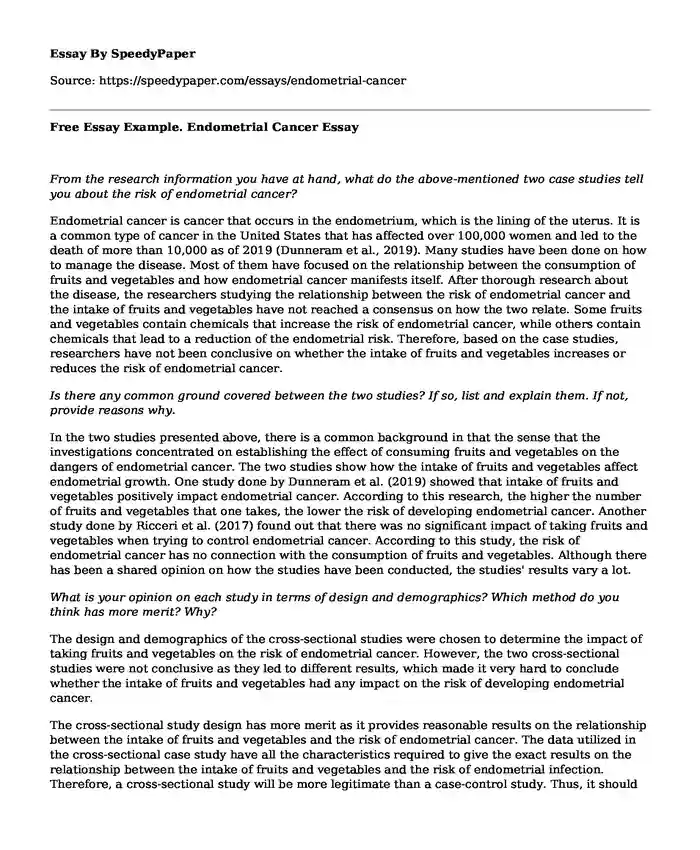From the research information you have at hand, what do the above-mentioned two case studies tell you about the risk of endometrial cancer?
Endometrial cancer is cancer that occurs in the endometrium, which is the lining of the uterus. It is a common type of cancer in the United States that has affected over 100,000 women and led to the death of more than 10,000 as of 2019 (Dunneram et al., 2019). Many studies have been done on how to manage the disease. Most of them have focused on the relationship between the consumption of fruits and vegetables and how endometrial cancer manifests itself. After thorough research about the disease, the researchers studying the relationship between the risk of endometrial cancer and the intake of fruits and vegetables have not reached a consensus on how the two relate. Some fruits and vegetables contain chemicals that increase the risk of endometrial cancer, while others contain chemicals that lead to a reduction of the endometrial risk. Therefore, based on the case studies, researchers have not been conclusive on whether the intake of fruits and vegetables increases or reduces the risk of endometrial cancer.
Is there any common ground covered between the two studies? If so, list and explain them. If not, provide reasons why.
In the two studies presented above, there is a common background in that the sense that the investigations concentrated on establishing the effect of consuming fruits and vegetables on the dangers of endometrial cancer. The two studies show how the intake of fruits and vegetables affect endometrial growth. One study done by Dunneram et al. (2019) showed that intake of fruits and vegetables positively impact endometrial cancer. According to this research, the higher the number of fruits and vegetables that one takes, the lower the risk of developing endometrial cancer. Another study done by Ricceri et al. (2017) found out that there was no significant impact of taking fruits and vegetables when trying to control endometrial cancer. According to this study, the risk of endometrial cancer has no connection with the consumption of fruits and vegetables. Although there has been a shared opinion on how the studies have been conducted, the studies' results vary a lot.
What is your opinion on each study in terms of design and demographics? Which method do you think has more merit? Why?
The design and demographics of the cross-sectional studies were chosen to determine the impact of taking fruits and vegetables on the risk of endometrial cancer. However, the two cross-sectional studies were not conclusive as they led to different results, which made it very hard to conclude whether the intake of fruits and vegetables had any impact on the risk of developing endometrial cancer.
The cross-sectional study design has more merit as it provides reasonable results on the relationship between the intake of fruits and vegetables and the risk of endometrial cancer. The data utilized in the cross-sectional case study have all the characteristics required to give the exact results on the relationship between the intake of fruits and vegetables and the risk of endometrial infection. Therefore, a cross-sectional study will be more legitimate than a case-control study. Thus, it should be considered when trying to find conclusive results on the relationship between the intake of fruits and vegetables and the risk of endometrial cancer.
What would additional information be needed to arrive at a conclusion?
The conclusions of a study take into consideration several factors. In a cross-sectional study, there is a need to consider several factors so that the conclusions made are legitimate. Some of the factors that need to be considered when arriving at conclusions in a cross-sectional study include the age of the patient, the race of the participants, the medical history, and many other factors that may impact the study results.
References
Dunneram, Y., Greenwood, D. C., & Cade, J. E. (2019). Diet and risk of breast, endometrial and ovarian cancer: UK Women’s Cohort Study. British Journal of Nutrition, 122(5), 564-574. https://www.cambridge.org/core/journals/british-journal-of-nutrition/article/diet-and-risk-of-breast-endometrial-and-ovarian-cancer-uk-womens-cohort-study/F566A1F5488D05B3877F686E3F489261.
Ricceri, F., Giraudo, M. T., Fasanelli, F., Milanese, D., Sciannameo, V., Fiorini, L., & Sacerdote, C. (2017). Diet and endometrial cancer: a focus on the role of fruit and vegetable intake, Mediterranean diet and dietary inflammatory index in the endometrial cancer risk. BMC cancer, 17(1), 757. https://link.springer.com/article/10.1186/s12885-017-3754-y.
Cite this page
Free Essay Example. Endometrial Cancer. (2023, Oct 15). Retrieved from https://speedypaper.net/essays/endometrial-cancer
Request Removal
If you are the original author of this essay and no longer wish to have it published on the SpeedyPaper website, please click below to request its removal:
- What News Have We Learned about the Diet over the Past Five Years?
- Behavioural Health Services for Bipolar Disorder, Essay Sample
- Essay Example - Melbourne Magistrate Courts
- Essay on End-of-Life Preparedness: Nursing Advance Directives & Public Awareness
- Traumatic Brain Injury Patient - Free Essay
- Service Learning Activity - Paper Sample
- Pharmaceutical Regulation and Control Across Nations: A Comparative Analysis Example
Popular categories





